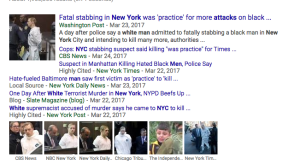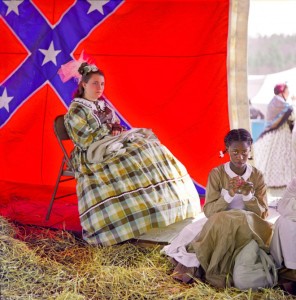By the time I finished reading Kowalczyk’s “Embedded with Reenactors,” I was fired up and ready to rant about it. And then, I found that Historiann did it for me. And, in a way, so did The Atlantic. As I began, Kowalczyk’s article ignited a couple of important questions for me: Is there a particular reason why the majority of these reenactors are middle-aged white dudes? Also, does the popularity of reenactment rise and fall based on the political and social realities of present time?
Don’t even get me started on the masculinity angle of these articles. You’ll get a blog post in the form of a dissertation.
Historiann’s article (by far my favorite piece this week) said it best: “Romanticizing the past, like reenacting, is a White thing.” And I think this is where I get hung up most on the idea of it all. Going back and romanticizing a time in which everything sucked for everyone but you is not something I could ever get behind. How many Civil War reenactors go out to the battlefield fired up to pretend to fight to free the slaves? (Okay, yes, I know, how many actually did in 1862, either…) I think that’s why I love Hamilton, the musical – sorry, Joe – it’s thoughtful reenactment: perhaps not accurate, but it gets as close to romanticization as possible, while using a cast made up of persons of color to highlight exactly why romanticizing history is problematic.
The Atlantic’s “Why doesn’t anyone think it’s cool to dress up like a Confederate soldier anymore?” touched on my question about addressing the present a little bit. In order to allow reenactments to survive into later generations, the reasons for it have to stay relevant. The obsession with the Civil War in the 1960s wasn’t just because it was 100 years – it was because the country was once again divided. In a different Atlantic article linked from the first, the same author, Kevin Levin, talks about how many bastions of southern (cough, white) pride once again felt threatened by the state of racial affairs in the United States, in the 60s. To celebrate the Civil War was to celebrate a heroic lost cause, and to perhaps even prepare to finish the job for good this time. The next generation of, um, prideful celebrants of heritage, are a little more bold in their remembrances than just wearing old military costumes and playing pretend. They are, terrifyingly, playing the game for real. I would be interested to know if any of them have fathers or grandfathers who are reenactors.

This also falls to the fact that Confederate memorials are being taken down, public places are being renamed, and “heroes” are remembered for what/who they really were. The reality is that social views are changing, and the volume of mainstream dialogue about how harmful celebrating things like, you know, racist murderers, is not so cool, is getting louder.
As for the Wikipedia gender gap… pffft.. shocker, there. People tell us that you can use Wiki to get a leg up on your research, as long as you scroll down to the bottom and look at/use the sources. I’ve spent months researching one particular person and just the other day decided to take a look at what wikipedia has to say about her: paragraphs of narrative with no sources. Cool. So how to professionals get in there, with the hope of presenting real, quality research to the public, and are denied? Sigh. This is why I don’t even take a glance: not just to avoid finding inaccurate information, but to also avoid going into a blind rage at the way that the site itself is run.
This was a long one. My bad.


